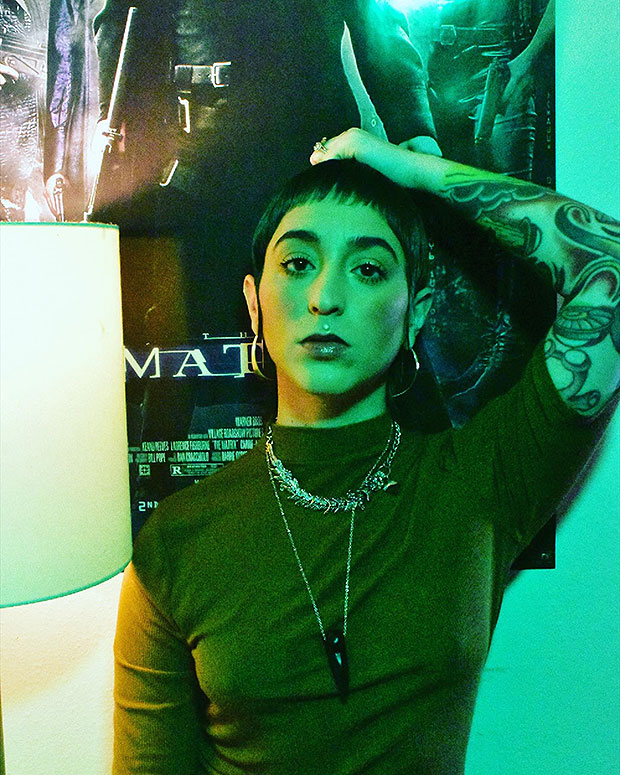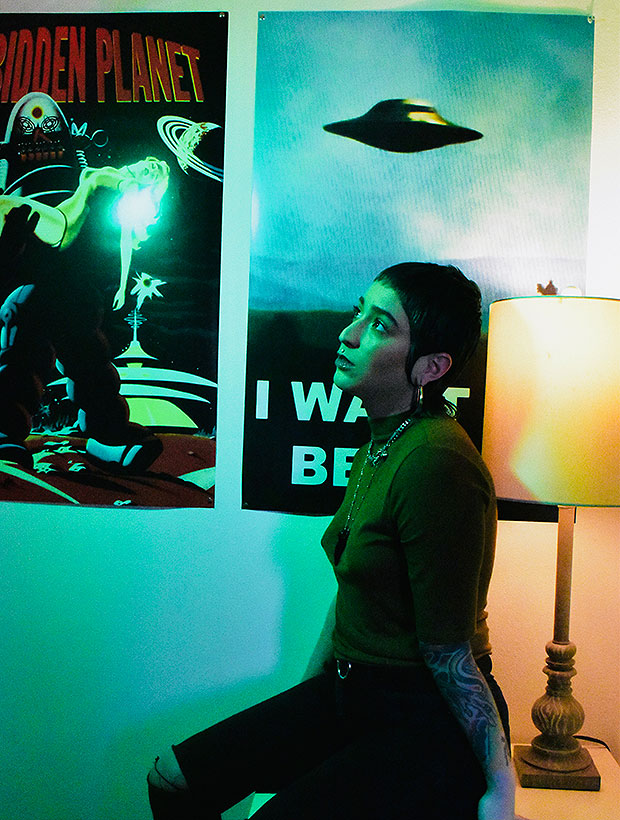PLEXXAGLASS Reveals How They Connected With Linkin Park’s Mike Shinoda For ‘LILITH’
Alt-pop singer PLEXXAGLASS unleashes a rallying cry for body autonomy and reproductive freedom, and they tell HL about the inspiration for ‘LILITH,’ how Mike Shinoda got involved, and more.
“Mike [Shinoda] is truly such a brilliant artist, and I feel so lucky to be able to say I’ve worked with him,” PLEXXAGLASS tells HollywoodLife over email, but after listening to “LILLITH,” the pleasure might be all his. “LILITH” is a stunning piece of dark pop. With a crawling, almost seductive beat that shoulders PLEXXAGLASS’s powerful voice, “LILITH” is a declaration (“It’s My Body”) that is as mournful as it is righteous. PLEXXAGLASS – aka Alexxa – explains in an EXCLUSIVE email interview that this song is “a big ‘f you’” to those who would use any systemic power – god or government, in this case – to strip away a person’s agency.
“I wrote “LILITH” probably over 2 years ago at this point,” they tell HollywoodLife “Like most folks with reproductive parts, black or brown skin, and/or identifying somewhere within the lgbtqia+ community, Donald Trump’s presidency was eye-opening in the worst way possible. … It brought out a lot more anger in my writing.”
Helping to channel that anger in this song is Mike Shinoda, who produced this new song. How did Alexxa connect with the Linkin Park frontman? It was, as they put it, one part talent and one part luck. “At the beginning of the year, he posted that he wanted to produce independent artist’s songs on his Twitch channel this year and asked that artists send him their songs,” they tell HL. After getting clued to it by a fan, Alexxa shared the demo on TikTok. “[That] got his attention, he followed me, and the rest is history.”
With that history written, the future now looks good — especially if it boasts artists like PLEXXAGLASS. During the conversation with HL, they reflect on how both “LILITH” and Lil Nas X’s “Montero (Call Me By Your Name)” use Christian imagery to convey the issues the LGBTQ+ community has with heteronormativity. They also speak more on collaborating with Shinoda and why they call their fans “Aliens.”
HollywoodLife: You described “LILITH” as a “rallying of folks within the entire sexuality and gender spectrum to denounce those who try to keep us from thriving.” Was there a specific moment that inspired you to put these feelings into song, or is this a sentiment brewing/composing for a while?
PLEXXAGLASS: I wrote “LILITH” probably over 2 years ago at this point— Like most folks with reproductive parts, black or brown skin, and/or identifying somewhere within the lgbtqia+ community, Donald Trump’s presidency was eye-opening in the worst way possible. It told us, with certainty, that there’s half this country that hates us. It brought out a lot more anger in my writing.
The song’s intro was actually spurned by a fascinating character study that Handmaid’s Tale provided within its third season— what happens when the oppressor starts to be affected by the oppression?
“Where is your God, knowing what you know now?” Where is your God now that your body is being controlled too? Where is your God now that people you love are being harmed? Is your God really worth all of this pain? Is ANY God or ideology worth this much pain? I think those questions are why people leave organized religion.
“LILITH” comes on the heels of another piece of art — “Montero (Call Me By Your Name)” — that used Biblical imagery to help convey the struggles with heteronormativity. Why do you think that these elements – Lilith for your song, Satan/the Garden of Eden for “Montero” – lend themselves as ways to convey these feelings?
So much of the injustices that [all] minorities face can be traced back to the church, and American/Western values are deeply entwined with the Bible. There is an unspoken pressure to conform, even in my family where we weren’t forced to go to church/temple, I forced myself to be the model woman for a really long time, knowing for years that I wasn’t exactly a woman at all. I think it’s no coincidence that so many of us [in the queer community] enjoy using those themes, in retaliation, to almost reclaim our stories from religions that try to condemn us. It’s definitely a big “f you.”
Lilith is such a fascinating figure because there’s not a lot of information about her in scripture(s). Most of what we have is considered more along the lines of folklore, but what we do know is profound: She was Adam’s first wife. She’s said to have been made from Adam’s same clay, not just his rib (Eve). Because they were made from the same source (freakin’ EQUALS), Lilith refused to submit to Adam being on top during sex, and leaves him— sounds like an OG feminist icon to me! In most modern biblical tellings, she’s left out of the story altogether, or written as just a slutty demon. She’s a trailblazer of autonomy, IMO.
Mike Shinoda of Linkin Park produced the track. How did you two connect? And do you remember the first time (or perhaps, the most important/impactful time) you heard Linkin Park?
I got really lucky. At the beginning of the year, he posted that he wanted to produce independent artist’s songs on his Twitch channel this year, and asked that artists send him their songs. One of my listeners (thank you, Jaclyn!) is a huge Shinoda/Linkin Park fan as well, and let me know about it. I posted a clip of the demo for “LILITH” on TikTok first, got his attention, he followed me (!!), and the rest is history.
Mike is truly such a brilliant artist, and I feel so lucky to be able to say I’ve worked with him. What he brought to this song is everything I could’ve dreamt it would sound like. He really just got what I was trying to do, and it doesn’t always happen like that. 12-year-old Alexxa probably would’ve shat themselves if they knew I’d eventually make a song with Mike freaking Shinoda.
As a creative force, you have the ability to define yourself as both a person and as an artist. What do you want people to think of when they hear/read/see the name PLEXXAGLASS?
I call my listeners my Aliens because I’ve always been drawn to the idea that I’m not of this earth, that I don’t quite belong, and I think they feel that too. I’ve always been someone who felt the need to build my own family, and to build my own sense of home. Growing up, music was such a huge comfort, and my headphones were often where I’d escape to when I felt alone. I’m someone who feels so much all the time, and my music is a little window into that. I hope that when people listen to my music, they feel like they’re coming home. It’s the best feeling, building my Alien fam.
—
Source: Read Full Article


